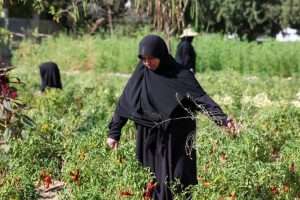Senegal’s ‘schools for husbands’ aims to save lives

Senegal’s United Nations-backed initiative aims to promote positive masculinity in rural and conservative communities according to Associated Press on August 17th.
“School for husbands” aims to directly address respected male community members who, in West African nations like Senegal, may harbour conservative, traditionalist views that sidelines and potentially actively harm the women in their lives.
Men, particularly in rural environments, often have the dominant say on household decisions which affect their wives or daughters, particularly on health matters.
Women may need permission for life-changing decisions on accessing family planning or other reproductive health services.
Ibrahima Diane, an imam based in Senegal’s capital Dakar, uses his sessions to educate groups of men on how and why they should support their wife, using the values of Islam to evoke the message.
“The Prophet himself says a man who does not help support his wife and children is not a good Muslim.” Diane remarks, as he sermons a group of men.
Diane regularly holds sermons advocating for an end to gender-based violence, and more education around HIV stigma and practices like female genital mutilation.
The latter is a particularly potent issue, given how other West African nations such as The Gambia are struggling to enforce a ban on the practice, recently resulting in the death of a one-month-old baby.
Thankfully, these sermons are beginning to bear fruit.
Habib Diallo, a 60-year-old former army commando, said attending the sermons and discussions with the imam taught him about the risk of home births. Eventually, this led to him urging his own reticent son to take his wife to the hospital, which he agreed to.
Senegal’s government is noting this shift, with the Ministry of Women, Family, Gender and Child Protection valuing the importance of men’s attitudes in mitigating maternal and infant mortality.
As female health worker Aida Diouf remarks, “without men’s involvement, attitudes around maternal health won’t change.”
The Senegalese government elected last year has already prioritised the importance of education more broadly, introducing a new program of teaching English in nursery and primary schools to enhance the prospects of the Senegalese youth.
This attitude towards education and progressiveness in Senegal has resulted in more communities embracing gender equality, abandoning the patriarchal norms that once defined them, which has further led to a reduction in the number of forced marriages.
However, challenges understandably persist, given the conception of gender as an abstract topic which could branch out into taboo issues such as LGBTQ+ rights.
One of the program’s coordinators, El Hadj Malick believes that talking about gender can be difficult, because “there is sometimes tension because it’s seen as something abstract or even foreign.”
He added that some men mistakenly believe such talk will promote LGBTQ+ issues, which in Senegal remains an extremely stigmatised subject, along with North African countries which have clamped down on rights groups.
But focusing on women’s health and wellbeing, Malick says, means the concept “becomes universal”.
Associated Press, Maghrebi.org
Want to chase the pulse of North Africa?
Subscribe to receive our FREE weekly PDF magazine














